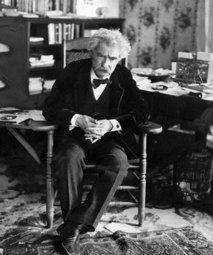
10 Jan 2011 23:10:25
The author and humorist worried enough about what he could say in public to withhold anti-religion essays and to forbid his autobiography from being published until 100 years after his death. The first of three planned volumes of the unexpurgated version, released in 2010 and including harsh words for American business and military actions, became a surprise best-seller that has sold hundreds of thousands of copies.
But Twain also believed in getting out the truth. "The Adventures of Huckleberry Finn" angered respectable people when it came out and still stirs a fuss 126 years later. Twain's most famous novel has been paired with "The Adventures of Tom Sawyer" in a volume to be published next month by NewSouth Books that replaces the "N-word" — an offensive but often-used expression in the 1880s — with "slave."
"He was profoundly a Victorian gentleman, or tried to be," says Twain biographer Ron Powers. "It mattered to him if his wife approved of what he wrote and he was eager to please the public. But there were categories, like race, before which he was intrepid. In San Francisco before the Civil War, he was run out of town because he was criticizing the police for beating up Chinese people."
"He walked a line where you could fall off on either side, to be much too conservative or by going so far that what you think is funny is not funny," says Robert H. Hirst, general editor of the Mark Twain Project at the University of California at Berkeley, where the autobiography was edited, then released by the University of California Press.
"He said early on that the only criticism he's interested in is that of the great general public. He's aiming at this big audience. He wasn't a `Not Ready for Primetime Player,' like on `Saturday Night Live.' He was a `Ready for Primetime Player' and was watching where he was on the line."
"Huckleberry Finn" comes as close as any book to the elusive status of "The Great American Novel." But its frank narrative about manners, race and rebellion in pre-Civil War time makes it an uncomfortable classic. When first published, "Huckleberry Finn" was criticized for advocating bad behavior, for being a "coarse book not likely to set a good example for the young," says Justin Kaplan, author of a Pulitzer Prize-winning Twain biography.
But Twain also believed in getting out the truth. "The Adventures of Huckleberry Finn" angered respectable people when it came out and still stirs a fuss 126 years later. Twain's most famous novel has been paired with "The Adventures of Tom Sawyer" in a volume to be published next month by NewSouth Books that replaces the "N-word" — an offensive but often-used expression in the 1880s — with "slave."
"He was profoundly a Victorian gentleman, or tried to be," says Twain biographer Ron Powers. "It mattered to him if his wife approved of what he wrote and he was eager to please the public. But there were categories, like race, before which he was intrepid. In San Francisco before the Civil War, he was run out of town because he was criticizing the police for beating up Chinese people."
"He walked a line where you could fall off on either side, to be much too conservative or by going so far that what you think is funny is not funny," says Robert H. Hirst, general editor of the Mark Twain Project at the University of California at Berkeley, where the autobiography was edited, then released by the University of California Press.
"He said early on that the only criticism he's interested in is that of the great general public. He's aiming at this big audience. He wasn't a `Not Ready for Primetime Player,' like on `Saturday Night Live.' He was a `Ready for Primetime Player' and was watching where he was on the line."
"Huckleberry Finn" comes as close as any book to the elusive status of "The Great American Novel." But its frank narrative about manners, race and rebellion in pre-Civil War time makes it an uncomfortable classic. When first published, "Huckleberry Finn" was criticized for advocating bad behavior, for being a "coarse book not likely to set a good example for the young," says Justin Kaplan, author of a Pulitzer Prize-winning Twain biography.

